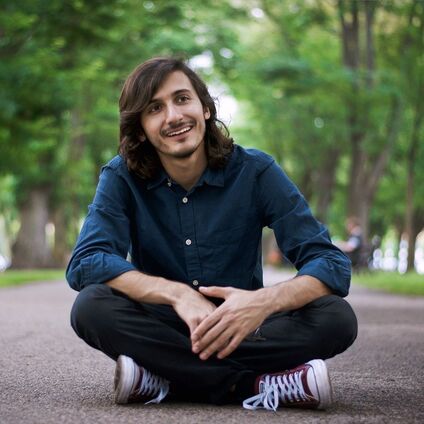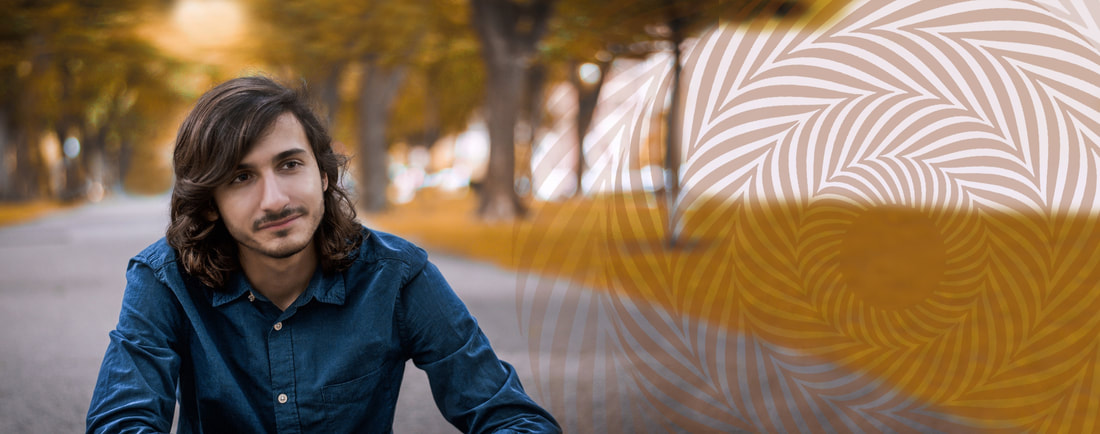
JCCalvet Interview
Q: Can you talk about your musical history?
A: Creating music, to me, started as nothing more than a response to that deep yearning that we all have to express our mind. At first no one ever knew about the songs I wrote, but as long as I could confess ideas to my guitar, the whole world felt in balance.
My first contact with music was through years of violin-playing as a young kid, but it wasn't until my teenage years, and the imminent discovery of rock music, that I realized all of this had meaning. I didn't think about the importance or seriousness of this at any given point - instead, I just kept doing it because those spurs of euphoria, the brief moments of creating something that didn't exist before, made the rest of life worth it. Years later, during my college period at Berklee, while sometimes discouraged by the massive competition from such a wide range of incredible musicians, other times I realized I did have potential, and most importantly, I had a voice with which I can, and always will, express my ideas, and -hopefully- have the world listen.
Q: What are some of the themes on your release RESIZE THE UNIVERSE?
A: In my album, there's an overarching theme that ties all the songs together. Each proposes a point of view, a sight into a different focus on my views on life. I like to believe that the listener, after experiencing the 20-minute ride that is my EP, has, for a little while, experienced brand new forms of perspective. It's very difficult, if not impossible, for us as humans to look out of our own minds and realize how small our problems are (from a spatial distant place: another mind, and from a temporary distant place: the past). Therefore, we are stuck, worried about the same mundane things again and again, while forgetting our bigger role within our own life and everyone else's.
The focal point of the album goes from extremely wide (the width of the ever-expanding universe) to as humane and intimate as it possibly can (the sharing of a moment with a loved one, below the shade of a tree).
Q: Can you talk about your creative process?
A: Most of my songs start with either a piece of a melody, or a piece of a lyric, that I then start to try to successfully sew with its counterpart. I find my best and most honest music isn't plotted out, but instead, I guide my way through the dark, twisting and turning, molding it to what I consider its best version.
Music production is a true love of mine, and most songs, as I write them, come with incorporated arrangements and productions in my mind. A lot of the times these are very abstract, but don't take much effort to materialize. While my best compositions I believe are the ones that come most naturally and, as I like to say, "in one seating,” my proudest productions take hours, days or months to polish to the smallest detail.
The idea that the making of art involves creating a physical, concrete idea, and that you can only go just one route within thousands of distinct arrangements, can be haunting. This, I find, is one of the most beautiful things about it, and why I love to do it the most. I think my biggest strength lies in not necessarily knowing what the best path to go is, but knowing which paths not to take.
Q: Can you talk about your musical history?
A: Creating music, to me, started as nothing more than a response to that deep yearning that we all have to express our mind. At first no one ever knew about the songs I wrote, but as long as I could confess ideas to my guitar, the whole world felt in balance.
My first contact with music was through years of violin-playing as a young kid, but it wasn't until my teenage years, and the imminent discovery of rock music, that I realized all of this had meaning. I didn't think about the importance or seriousness of this at any given point - instead, I just kept doing it because those spurs of euphoria, the brief moments of creating something that didn't exist before, made the rest of life worth it. Years later, during my college period at Berklee, while sometimes discouraged by the massive competition from such a wide range of incredible musicians, other times I realized I did have potential, and most importantly, I had a voice with which I can, and always will, express my ideas, and -hopefully- have the world listen.
Q: What are some of the themes on your release RESIZE THE UNIVERSE?
A: In my album, there's an overarching theme that ties all the songs together. Each proposes a point of view, a sight into a different focus on my views on life. I like to believe that the listener, after experiencing the 20-minute ride that is my EP, has, for a little while, experienced brand new forms of perspective. It's very difficult, if not impossible, for us as humans to look out of our own minds and realize how small our problems are (from a spatial distant place: another mind, and from a temporary distant place: the past). Therefore, we are stuck, worried about the same mundane things again and again, while forgetting our bigger role within our own life and everyone else's.
The focal point of the album goes from extremely wide (the width of the ever-expanding universe) to as humane and intimate as it possibly can (the sharing of a moment with a loved one, below the shade of a tree).
Q: Can you talk about your creative process?
A: Most of my songs start with either a piece of a melody, or a piece of a lyric, that I then start to try to successfully sew with its counterpart. I find my best and most honest music isn't plotted out, but instead, I guide my way through the dark, twisting and turning, molding it to what I consider its best version.
Music production is a true love of mine, and most songs, as I write them, come with incorporated arrangements and productions in my mind. A lot of the times these are very abstract, but don't take much effort to materialize. While my best compositions I believe are the ones that come most naturally and, as I like to say, "in one seating,” my proudest productions take hours, days or months to polish to the smallest detail.
The idea that the making of art involves creating a physical, concrete idea, and that you can only go just one route within thousands of distinct arrangements, can be haunting. This, I find, is one of the most beautiful things about it, and why I love to do it the most. I think my biggest strength lies in not necessarily knowing what the best path to go is, but knowing which paths not to take.
Q: You have experience as an engineer. How was that a factor in the creation of RESIZE THE UNIVERSE?
A: The studying of audio engineering and going through the first stages of gaining experience as an engineer were an essential piece in the puzzle of my record-making. As you start seeing musical notes as decibels and frequencies for the first time, you uncover a layer of truth that you've never experienced before in the music that you love, and this to me was revelatory and influential in my process. Understanding this microcosm of sound, and how it ultimately affects the emotional impact of a listener, while simultaneously being able to zoom out and going back to listening as a music-lover, and its effect as a whole, is to me the key of how I am able to convey the meanings behind my records.
For RESIZE THE UNIVERSE, I was able to collaborate with brilliant engineers (Godi Gaviria [tracking] and Santiago Salazar [mixing]) who helped me push my vision forward. But the understanding that all of these processes are but a single one, is what has allowed me to keep pushing my own limits.
Q: What are some of the themes and topics you explore in the album?
A: Some themes that are widely present in my album include the universe, humanity, time, love and lack thereof. Some songs take common themes and apply them to a grander, unusual scale. For example, "Her" is a song that elaborates on the sorrow that loss of love causes on an individual, and uses it as an analogy to the pain that we as humanity cause on the planet Earth, and ponders on our capacity to make up for it. "Half Asleep" captures a small cinematic, poignant scene that I once experienced, and interconnects it to our past, our future and our role within everything else.
Q: What else should we know about your music?
A: As with any art that aims to be good in the world, my biggest hope is for you, the listener, to feel some sense of belonging in my songs. I've found solace in listening to artists I love, who through their words and melodies, give me company. Even if we never meet, I truly hope you can afford to understand me through my songs, which are more me than I will ever be. And hopefully, they can make you feel a little more in company in this strange world.
A: The studying of audio engineering and going through the first stages of gaining experience as an engineer were an essential piece in the puzzle of my record-making. As you start seeing musical notes as decibels and frequencies for the first time, you uncover a layer of truth that you've never experienced before in the music that you love, and this to me was revelatory and influential in my process. Understanding this microcosm of sound, and how it ultimately affects the emotional impact of a listener, while simultaneously being able to zoom out and going back to listening as a music-lover, and its effect as a whole, is to me the key of how I am able to convey the meanings behind my records.
For RESIZE THE UNIVERSE, I was able to collaborate with brilliant engineers (Godi Gaviria [tracking] and Santiago Salazar [mixing]) who helped me push my vision forward. But the understanding that all of these processes are but a single one, is what has allowed me to keep pushing my own limits.
Q: What are some of the themes and topics you explore in the album?
A: Some themes that are widely present in my album include the universe, humanity, time, love and lack thereof. Some songs take common themes and apply them to a grander, unusual scale. For example, "Her" is a song that elaborates on the sorrow that loss of love causes on an individual, and uses it as an analogy to the pain that we as humanity cause on the planet Earth, and ponders on our capacity to make up for it. "Half Asleep" captures a small cinematic, poignant scene that I once experienced, and interconnects it to our past, our future and our role within everything else.
Q: What else should we know about your music?
A: As with any art that aims to be good in the world, my biggest hope is for you, the listener, to feel some sense of belonging in my songs. I've found solace in listening to artists I love, who through their words and melodies, give me company. Even if we never meet, I truly hope you can afford to understand me through my songs, which are more me than I will ever be. And hopefully, they can make you feel a little more in company in this strange world.

